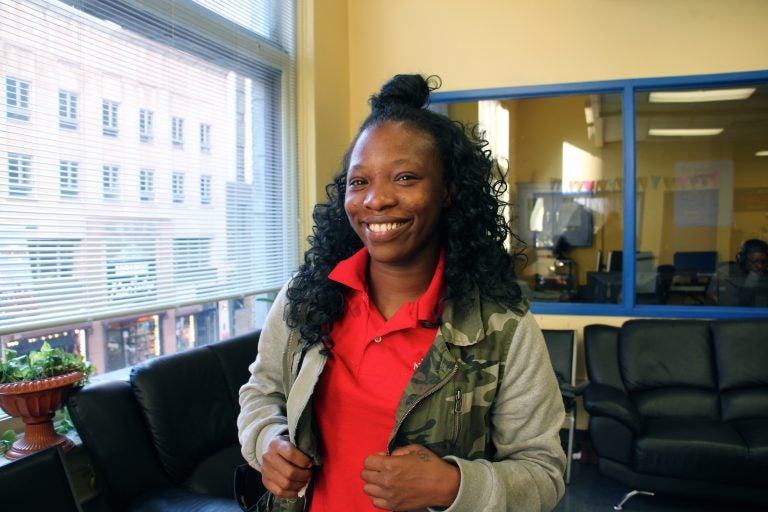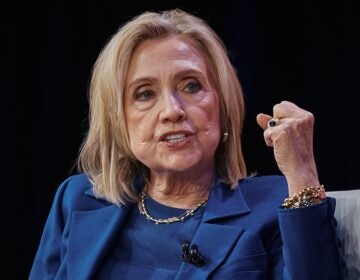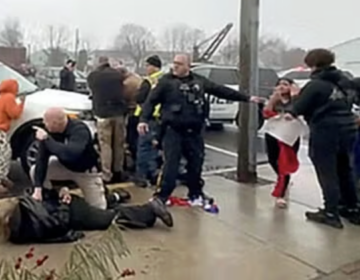Philly activists raising money to bail poor defendants out of jail
A coalition of Philadelphia activists who want to end the city's longstanding cash bail system aren't waiting for the system to change.

Jojuan Powell got to spend Mother's Day with her 10-year-old son, Sufyan, because of the Mama's Bailout Day campaign. (Emma Lee/WHYY)
For trying to play peacemaker, Jojuan Powell went to jail.
Authorities didn’t believe her claim that she was trying to break up a fight outside her Mantua home last May. So after a teen emerged from the brawl with a broken arm, Powell, 28, found herself behind bars on felony assault charges — wondering how she’d ever afford the $2,501 bail a judge set as her price for freedom.
But her timing proved providential: Five days into her jail stint, local activists participating in National Mama’s Bail Out Day paid her bail.
Without that help, she would have spent four months — the time it took before she beat her case — behind bars.
“I’m a lunch lady,” said Powell, who has a 10-year-old son. “Right now, I make $10.50 an hour. That’s (the $2,501 bail) like seven or eight or nine checks. It was like: Where am I gonna get this from?”
The May effort, intended to free incarcerated mothers for Mother’s Day, proved so successful its organizers have decided to expand it into the Philadelphia Community Bail Fund, an ongoing campaign for all inmates. The fund is joint effort by groups that have mobilized against mass incarceration, including the #No215Jail coalition, Black Lives Matter Philadelphia, Sankofa Community Empowerment, Frontline Dads, Media Mobilizing Project, DecarceratePA and the Youth Art Self-Empowerment Project.
It’s the second such fund in the city. Another — the Philadelphia Bail Fund — is helmed by former city policy director Maia Jachimowicz. That fund launched last week with a $50,000 goal to begin bailouts, Jachimowicz said, and it’s already raised about $17,000 in ten days.
The two funds are among about 25 nationally, according to Pilar Weiss, project director of the National Bail Fund Network. The largest, in Brooklyn, New York, bails out about 2,000 people a year, Weiss said. To compare, the Mama’s effort in Philly raised $60,000 in a week and paid bail for 13 incarcerated mothers — and another handful since then, organizers said.
All such funds are intended as temporary, stopgap measures until authorities can reform longstanding cash bail systems, where pre-trial inmates who can’t afford even low bail can get trapped for months, or even years, behind bars.
That can cost them jobs, housing, and even custody of their children. And defendants who spend time in jail before trial also tend to have to have higher conviction rates, longer sentences, and an increased likelihood to reoffend, reformers say. Many report feeling pressured to accept guilty pleas just to get out of jail, they add.
It’s an especially pressing issue in Philadelphia, which is both the poorest big city in America and a city with one of the nation’s highest incarceration rates.
“People shouldn’t have to buy their freedom,” said Reuben Jones, executive director of Frontline Dads.
And because racial disparities infect the criminal justice system, “the bail system in Philadelphia unjustly punishes poor people of color,” Jones added.
Thousands of lives hang on the line.
Just 20 percent of the 6,800 people in city jails have been convicted and sentenced, according to Julie Wertheimer, chief of staff of criminal justice in the city managing director’s office. The rest are people held for psychiatric evaluations, probation or parole violations, or other detainers (50 percent); pre-trial defendants charged with non-murder offenses (25 percent); and pre-trial defendants held for murder, a no-bail offense (5 percent), Wertheimer said.
Less than 3 percent of all city inmates — about 170 people — are there on $5,000 or less bail. To get out of jail, inmates have to post 10 percent of their bail — so that means just $500 or less is keeping these low-bail inmates behind bars.
The bail fund activists have plenty of big names backing their battle.
State Rep. Joanna E. McClinton, D-Philadelphia, introduced a bill in April to reform money bail.
City Councilman Derek Green scheduled a Nov. 3 public hearing to explore bail reform.
And City Controller Alan Butkovitz issued a report earlier this month projecting $75 million in annual savings if the city eliminated its cash bail system. (Wertheimer disputes that report.)
Even Eagles safety Malcolm Jenkins, an increasingly vocal criminal justice reformer, has thrown his support behind bail reform.
The city, meanwhile, already has been trying to reduce its pretrial inmate population under its MacArthur Foundation Safety and Justice Challenge, a two-year, $5.5 million reform effort aimed at reducing the city prison population overall. One example: An early bail reform initiative, launched in July 2016, that requires a bail review for defendants held for non-violent offenses on bails of $50,000 or less. Under that program, 85 percent of those who received a hearing were released, according to Michael P. Bouchard III, director of pretrial services for the First Judicial District. About 8 percent of all city inmates — about 550 — are held on $50,000 or less bail, Bouchard added.
Such efforts are good starts. But ending cash bail everywhere remains the overriding goal for many reformers.
“The law, as the Supreme Court has said, is that in our free society, liberty pre-trial is the norm and detention is the carefully limited exception. But in practice, the opposite is true, and detention is the default and release is the exception,” said Mark Houldin, policy director at the Defender Association of Philadelphia, which represents about 70 percent of everyone arrested in Philadelphia. “So we drastically need bail reform.”
Weiss agreed: “There’s no other country in the world that incarcerates people at the level that the U.S. does, where many people in prison have not been found guilty of any crime at all; they’ve just been charged … The bail system, in its purest original intent, was only supposed to secure that people come back to court. Instead, it has been used as a way to punish people and incarcerate people. Untangling the obsession with tough-on-crime (policies) and racist assumptions about risk have really stymied what should be pretty straightforward.”
In Powell’s case, she still marvels that she might have spent months in jail for a crime she didn’t commit.
The time she spent at Riverside Correctional Facility, the city’s jail for women, was “the horriblest experience ever.”
“I couldn’t believe it because just two weeks prior to that, I was in Disney World with my son. So it was like: ‘I was just in Disney World with my child and now I’m sitting in a jail cell?’ It was just unimaginable,” Powell said. “I was just busting out in tears every five minutes and people were asking me, ‘What’s wrong? What’s wrong? What’s wrong?’ Every minute in there was like an hour to me.”
The tears flowed again when she heard activists had raised money to spring her from jail.
“It was like the best thing you can ever hear in your life,” said Powell, who eventually won her case after her accusers failed to appear in court and witness videos proved her innocence. “It was just so amazing, I was crying so much.”
WHYY is your source for fact-based, in-depth journalism and information. As a nonprofit organization, we rely on financial support from readers like you. Please give today.



